Egypt
Egypt: The End of an Era in the Land of the Nile
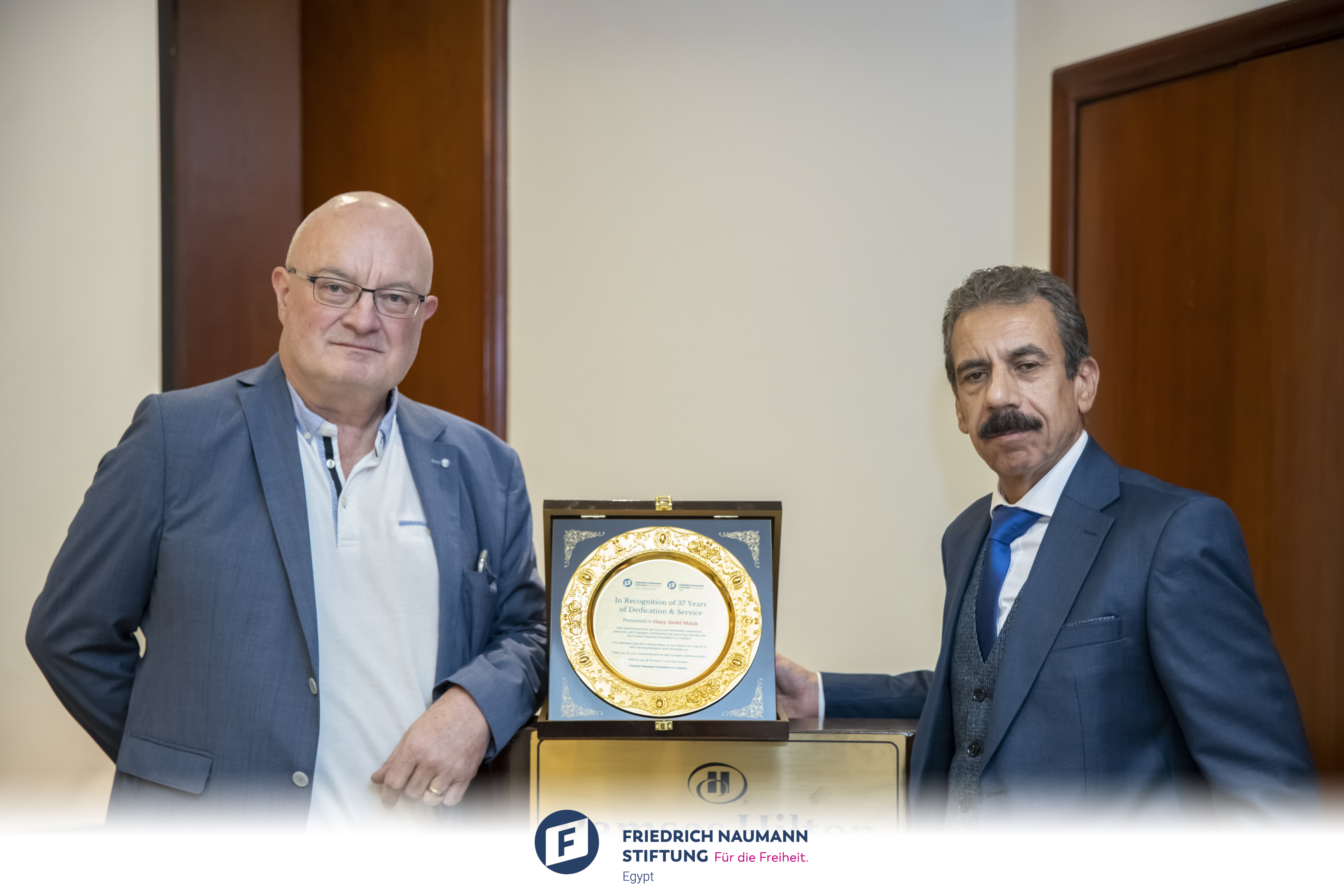
FNF Regional Director MENA Mr. Jörg Dehnert and Mr. Hani Abdel-Malak in 2024
© FNFFor the foundation, December 31, 2024, marks the end of an era, both institutionally and personally!
On the one hand, the foundation’s office in Cairo will close after nearly 50 years. On the other hand, the foundation is bidding farewell to its Program Director, Mr. Hani Abdel-Malak, who is retiring after more than 37 years of service. Having been part of the foundation for 37 years, Mr. Abdel-Malak has personally experienced and shaped nearly 80% of the foundation’s history in Egypt. We take this upcoming retirement as an opportunity for a Christmas interview with our esteemed and highly regarded colleague.
The interview was conducted by Ralf Erbel, Head of the MENA and Sub-Saharan Africa unit.
Dear Mr. Hani, over 37 years ago, on August 15, 1987, you began your service with the foundation in Cairo as an assistant. On December 31, you will retire as Program Director. Respect! This makes you the longest-serving international staff member of the foundation!
When you joined the foundation, Egypt and the world were very different from today: The Berlin Wall was still standing, Germany and Europe were divided into East and West, and in Egypt, President Hosni Mubarak, who had only recently come to power, was ruling a country with half the population of today’s Egypt.
Dear Mr. Hani, although you’ve been with us for so long, few of us know about your early days at the foundation. How did you come to join the Friedrich Naumann Foundation?
Hani Abdel-Malak: I was born in 1960, to a middle-class urban family in Cairo. My mother was a housewife and my father was a university graduate with a degree in history who worked in education and coaching. Looking back, I have somewhat followed in his footsteps, working in training and education.
I became acquainted with the Friedrich Naumann Foundation during my university studies (1979-1983) at Cairo University, where I was pursuing a degree at the Faculty of Mass Communication. As Egypt’s premier institution for journalism and media training, this faculty was the foundation’s main partner in Egypt in these days.
Back then, the foundation’s study trips abroad, which allowed aspiring TV and radio journalism students to familiarize themselves with global developments and crises on-site, were particularly popular. It was a huge opportunity for students of my generation, most of whom had never been abroad at a young age.
I was so drawn to the prospect of participating in these international trips that I picked my major in “Radio and TV”.
Now that’s a commitment! I am curious: which country did the international study tour program take you to?
Hani Abdel-Malak: You’ll laugh: By the time my cohort was eligible to apply for a study trip abroad, the foundation had already discontinued this apparently too-costly program.
Instead of visiting other Arab or African countries, my classmates and I went to Egypt’s Ismailia on the Suez Canal and to the Fayoum Oasis, both just a few hours’ drive from Cairo.
After graduating, I worked for four years in the private sector, including for the Sheraton hotel chain, until I saw a job advertisement from the foundation in Egypt’s major daily newspaper, “Al-Ahram,” in 1987 and applied for the position.
The foundation was seeking an assistant for its aforementioned journalist support programs, and knowledge of the hotel and event industry was considered advantageous. Among approximately 50 applicants, I won the position and was offered a two-year fixed-term contract. I took the risk and resigned from my permanent position at Sheraton. The risk paid off; two years turned into 37.
Photo gallery
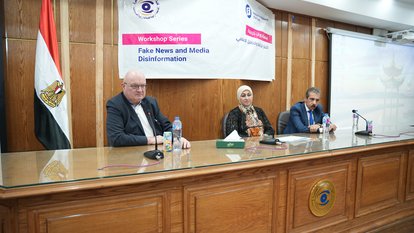
FNF Regional Director MENA Mr. Jörg Dehnert and Mr. Hani Abdel-Malak at the Cairo University in 2024.
© FNF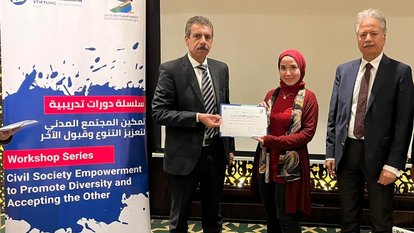
Tolerence workshop in 2022.
© FNF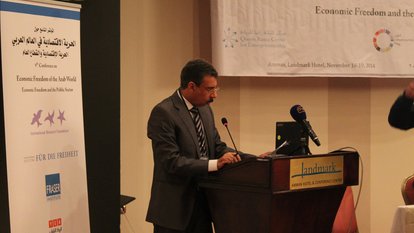
Mr. Hani Abdel-Malak at the Amman Economic Freedom Regional Conference in 2014.
© FNF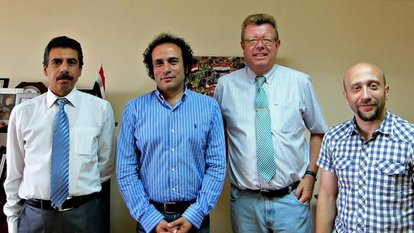
Mr. Hani Abdel-Malak with Dr. Ronald Meinardus, Amr Hamzawi and Shehab Wagih in 2013.
© FNF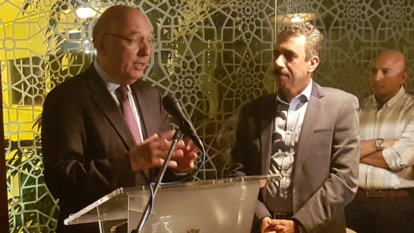
Mr. Hani Abdel-Malak with Mr. René Klaff, Head of the International department.
© FNF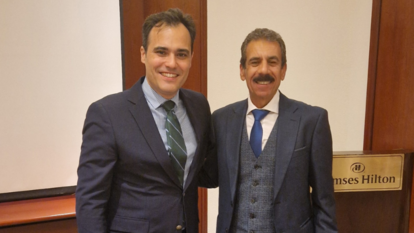
Mr. Hani Abdel-Malak with Mr. Ralf Erbel, Head of Subsaharan Africa and MENA Unit.
© FNFHow many directors have you seen come and go in Cairo over these decades?
Hani Abdel-Malak: I’ve counted, there were eight, starting with Georg-Heinrich von Eichborn, who hired me in 1987, to Jörg Dehnert, the current Regional Director for MENA in Amman. As diverse as my supervisors were, with their different personalities, I was able to learn and develop from each of them. I am grateful for that as well.
Dear Mr. Hani, during your farewell celebration, friends and partners of the foundation praised your professional career and contributions. Besides professionalism, reliability, and humility, one comparatively trivial trait kept coming up: your style and appearance. Many people know you only in a suit and tie.
Hani Abdel-Malak: Well, on regular office days without events or appointments, I also come to work in jeans. But it’s true: You only get one chance to make a first impression. At events and important appointments, I always wear a suit. I’ve also tried to pass this on as an advice to younger colleagues. I must admit, in this regard, I may be a bit old-fashioned.
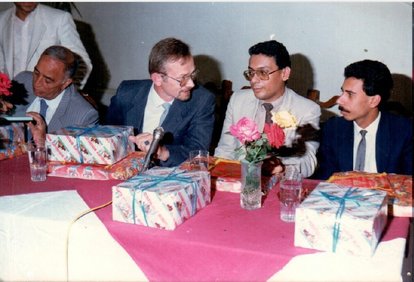
1988, Hani Abdel-Malak and FNF project director Mr. Georg-Heinrich von Eichborn
© FNFAs your career evolved, so did the foundation’s work in Egypt…
Hani Abdel-Malak: The foundation’s work and the political framework in Egypt have both changed significantly over the years.
Until 1997, the foundation’s work in Egypt was relatively apolitical in the narrow sense of the word. This may sound strange to younger colleagues. The main focus was on the aforementioned development cooperation in media/journalist training and the strengthening of agricultural cooperatives. During these years, the foundation operated two offices in Egypt: one in Cairo for the media project and one in Ismailia for the agriculture project.
In 1996, the foundation’s board decided to move the regional office to Cairo. Shortly thereafter, in 1997, the foundation began project work with civil society and political actors in Egypt. This was certainly a significant turning point.
I will never forget how the foundation, around 1998/99, together with a prominent Egyptian political activist, conducted a workshop on the role and challenges of political parties in Egypt. The event space was packed, and the speakers did not mince words in their criticism of the political framework. I admit: I was very worried. But to my surprise, the event passed without any backlash from the authorities.
What was the political situation back then, in the 1990s?
Hani Abdel-Malak: Egypt, especially Upper Egypt, suffered greatly from terrorism in the early and mid-1990s. There were several horrific attacks during these years, including against foreign tourists, aimed at destroying the tourism sector and bringing the government to its knees. The images of these attacks went around the world. The government cracked down hard on these groups. There was little room for political parties during this time.
What happened next for the foundation in Egypt?
Hani Abdel-Malak: In the 2000s, the political system opened up somewhat, creating more room for political and civil society engagement. Economically, those were relatively good years as well.
One of my favorite projects was the foundation’s Arabic language publication series on liberalism. The entire project began around 2008 with a public writing competition called “Why I am a Liberal.” We received contributions from young people all over Egypt. The best articles were published in a book and distributed at Cairo’s major book fair.
In the years that followed, political education work, especially with young liberal party activists, became an important focus. After the so-called Arab Spring in 2011, liberal organizations networked to give liberal politics a voice. It was a very exciting time.
Following the political upheavals, by the end of 2014 the foundation had to restructure its work in Egypt and renegotiate its legal status. Ultimately, the foundation decided to move the regional MENA office from Cairo to Amman in 2016. I was one of only two employees that remained in Cairo. Since our project work in Egypt itself was suspended until 2018, I worked as a “Regional Project Coordinator” throughout the MENA region during those years.
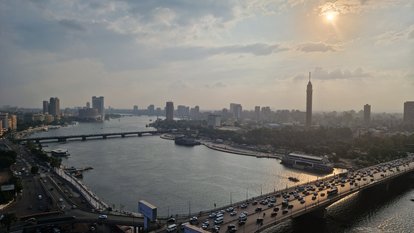
Cairo: FNF bids farewell after 49 years of presence
© FNFSince the regional office’s move from Cairo to Amman in 2016, you have been almost alone on-site in Cairo as Program Director. How did you experience this phase?
Hani Abdel-Malak: It was a very contradictory time. Working more or less alone from an office is not an ideal situation. That said, I am very grateful for the trust placed in me by the foundation. I was allowed to represent the foundation in Egypt during these years and grew into a new role.
I hope I don’t sound immodest when I tell you how honored I was to be invited by the German Embassy to a roundtable with Federal President Walter Steinmeier during his state visit in October 2024. I was the only Egyptian at the table representing a German organization. Towards the end of my career, this was definitely a highlight for me.
Mr. Hani, if you could go back in time to 1987 and the vacancy ad in Al-Ahram newspaper: Would you reapply for the position?
Hani Abdel-Malak: Of course I would. I never once regretted it! It also gives me great satisfaction to see how many of our partners and participants have grown into leadership positions in Egypt, from the media to parliament. There is an impact to our work!
Dear Mr. Hani, we wish you all the best, health, and happiness for your future! But first, Merry Christmas, which in the Coptic Church, in your church, is celebrated not on December 25th, but on January 7th. “Shukran, and ma’ as salama!”
Thank you very much. And I will be your man in Cairo if you decide to visit this special country with 5000 years of history. Ma’ as-salama!
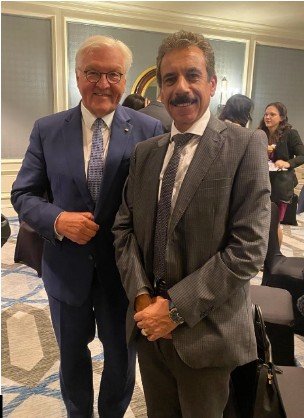
Hani Abdel-Malak and German President Frank-Walter Steinmeier in Cairo in 2024
© FNF